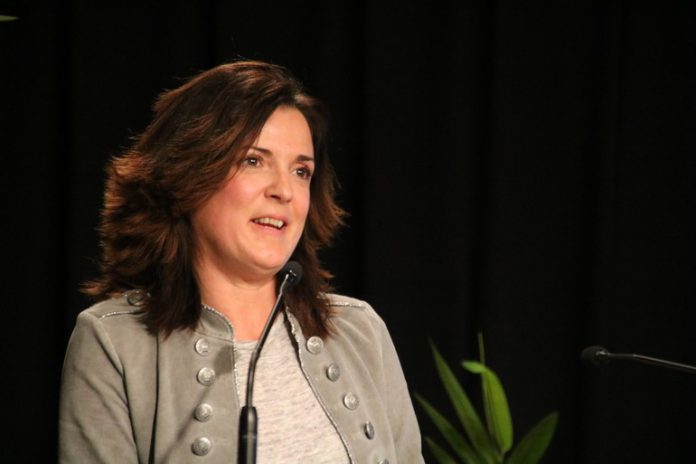Afrikaldia, Afrikako Zinemen Euskal Jaialdia, gaurtik urriaren 8ra bitartean izango da Gasteizen, eta migrazioa, berdintasuna eta pertsonen mugikortasuna izango ditu ardatz, Afrikaren ikuspegitik. Inaugurazio-ekitaldia Europa Jauregian egin da, Beatriz Artolazabal Eusko Jaurlaritzako Berdintasun, Justizia eta Gizarte Politiketako sailburuaren parte-hartzearekin.
Artolazabal Sailburuaren ustez, ”ohore handia da Euskadin zinegile afrikar eta afrikarrak hartzea, sorkuntza zinematografikoak aurkezten dizkigutelako eta Afrikaren karisma, indarra eta talentua alderatzen dituztelako. Topaketa horrek erraztu egiten du pertsonak eta gizarteak eraldatzea, estereotipoak apurtzea, aurreiritziak eta beldurrak gainditzea, eta, azken batean, tolerantzia eta bizikidetza lantzea”.
Kulturartekotasuna aberastasuna da eta begiradek eraldatu egiten gaituzte. Euskal lankidetzak herrialde eta lurralde askotako prozesuak laguntzen ditu, pertsona guztiek giza garapen iraunkorra eta justizia soziala lor dezaten. Afrika oso ezezaguna da oraindik, nahiz eta hurbil egon, eta gero eta afrikar jatorriko biztanle gehiago daude gure inguruan. Eusko Jaurlaritzako Berdintasun, Justizia eta Gizarte Politiketako Sailean uste dugu Euskadin ere gizarteari prozesu horien parte izaten lagunduko dioten ekintzak garatu behar ditugula.
Artolazabalek adierazi duenez, eLankidetza-Garapenerako Lankidetzaren Euskal Agentziak hainbat ekimen babesten ditu, hala nola Afrikaldia, ezagutza bultzatzen eta herritarrak sentsibilizatzen dituztenak, aniztasuna ospatzen dutenak, kulturen arteko bizikidetzaren alde egiten dutenak eta zinemaren eta topaguneen bidez gogoeta eginarazten dutenak.
Bertan izan dira, halaber, Alvaro Iradier, Afrikanistaren presidentea, Beatriz Leal, Lehiaketaren programatzailea eta Paul Ortega, eLankidetza-Garapenerako Lankidetzaren Euskal Agentziako zuzendaria. Izaera lehiakorreko nazioarteko zinema-lehiaketa hau publiko guztiei zuzenduta dago. Florida zinemetan dozena bat proiekzio izango dira, Afrikako errealitatea kalitatezko zinemaren bidez ezagutzeko.
Afrikaldia Manuel Iradier Afrikar Elkarteak eta Bendera Kultura Elkarteak antolatzen dute. Jaialdiaren astean zehar, hainbat zuzendari, aktore eta aktore Araba-Arabako Campusean izango dira, Afrikako herrialdeek bizi duten egoera politiko eta migratzaileaz hausnartzeko eta eztabaidatzeko.
Euskadiko hiriburuko Florida zinema-aretoetan proiektatuko diren filmen artean, berdintasunari, gazteriari, migrazioei eta garapenerako lankidetzari lotutako hainbat eduki daude.
Afrikaldia Manuel Iradier Afrikar Elkarteak eta Kultura Bendera Elkarteak antolatzen dute, Gasteizko Afrikako diasporaren partaidetzarekin. Jaialdiaren astean, hainbat zuzendari, aktore, ekoizle eta aktore Gasteiz bisitatuko dute, horietako batzuk Arabako Campusera hurbilduko dira, Afrikako herrialdeek bizi duten egoera politiko eta migratzaileaz hausnartzera eta eztabaidatzera. Proiektatzen diren filmen artean, berdintasunari, gazteriari, migrazioei eta garapenerako lankidetzari lotutako hainbat eduki daude.
Urriko lehen astean, euskal hiriburuko Florida zinemetan hamabi proiekzio izango dira, Afrikan kalitatezko zinemaren bidez murgiltzeko. Sail ofizialak fikziozko 6 film luze eta 6 dokumental eskainiko ditu, 20 herrialde baino gehiagorekin. Estatu mailako 3 estreinaldi izango dira: Hegoafrikako Mlungu Wan filma, Jenna Cato Bassena, Ema Edosio nigeriarraren Otiti eta Amil Shivjiren Vuta N «kuvute. Gainerako filmak lehen aldiz proiektatuko dira Euskadin.
Aurten, Silvia Ruiz de Austriren Katixa ikus-entzunezko ekoizleak, Armando Buika aktoreak eta Arantza Ibarra zuzendariak osatuko dute epaimahaia. 3 pertsona horiek argitalpenaren errealizazio onena bereizteko ardura izango dute.
Lankidetzak
Montehermoso Jauregia izango da jaialdiaren beste topaguneetako bat. Gasteiz Film Office-ren lankidetzarekin industria atala landuko da, sektoreko profesionalentzako topaleku bat, nazioko eta nazioarteko gonbidatuekin hitzaldi eta eztabaida ziklo bat izango duena.
Gainera, edizio berri honetan, jardunaldi akademikoak errepikatuko dira. Afrikako kultura UPV/EHUko ikasleei hurbiltzeko asmoz, Arabako Campusak 4 titulu proiektatuko ditu, ondoren Afrikaldiaren bigarren edizioaren gai nagusian espezializatutako dinamizatzaileekin solasaldi bat eginez amaitzeko.
Afrikaldiak aliantza baten aldeko apustua egin du berriz ere Gasteizko Udalaren kaleko hezkuntza programekin. Hiriko hainbat gizarte-etxetan, Karina Senatorek, Afrikaldiaren kartelaren diseinatzaileak, 12 eta 17 urte bitarteko nerabeentzako collage artistikoko tailer bat zuzenduko du.
Xedeak
Afrikaldia da penintsulako iparraldeko Afrikako Zinemen Jaialdi bakarra. Kultura Bendera Elkartea eta Manuel Iradier Afrikar Elkartea erakunde sustatzaileek giza garapen integrala sustatzen dute, Afrikako kulturen aniztasuna eta aberastasuna ikusaraziz. Gainera, euskal kulturaren eta afrikarren arteko topaguneak sustatu nahi dira, gizarte-kohesioa bultzatuz.
Erakunde sustatzaileez gain, Gasteizen finkatuta dauden Afrikako pertsonen hamabi elkartek aktiboko parte hartzen dute Afrikaldia´rekin. Horien guztien artean, gizarteen arteko zubiak eraikitzen laguntzen dute, Afrikari buruzko begirada zabalduz eta haren ekoizpen zinematografikoari balioa emanez.
Bigarren edizio honetako kartela Karina Senatorek egin du, Euskal Herriko Unibertsitatean Sorkuntzan eta Diseinuan graduatua. Afrikako kontinentearen migrazio-errealitatea islatzen duen irudia da, eta bi gaztek ordezkatzen dute, oro har, prozesu horietan gehien inplikatutako biztanleria. Informazio gehiago: https://www.afrikaldia.com
-
- A NUIT DES ROIS (The Night of the Kings), by Philippe Lacôte (Ivory Coast/France/Canada/Senegal, 2020) will open the competition. A small delinquent enters frightened in «La Maca», a prison in the middle of the Ivory Coast forest that is governed by its own rules and where the prisoners are the true rulers. The head of the prison, sick and forced to commit suicide according to internal rules, chooses this inmate as the new storyteller. When the moon turns red, he must begin to tell his story, and when it is over, face his fate. He chooses the story of Zama King, an assassin, an idol for the rest of the inmates. The night advances, the danger is constant, but imagination and creativity overflow.
-
- 143 RUE DU DÉSERT (Desert Street, 143), by Hassen Ferhani (Algeria / France / Qatar, 2019) tells that, in the middle of the Algerian Sahara, a woman writes her story in her living room. There she welcomes truck drivers, wandering beings and her dreams with a cigarette, a coffee or some eggs… Her name is Malika.
-
- DANS LA MAISON (In the house), by Karima Saïdi (Belgium / France / Morocco / Qatar, 2020) narrates that, after years of separation, the filmmaker is reunited with her mother, Aïcha, who suffers from Alzheimer’s. From Brussels to Tangier, between modesty and confession, pains, ruptures, duels and joys take shape: everything that has marked the odyssey of a family marked by exile.
-
- FEATHERS (Plumas), by Omar El Zohairy (Egypt/Netherlands/Greece/France, 2021) begins at a children’s birthday party, when a magician turns the child’s authoritarian father into a chicken. The family’s problems will begin when the magician is unable to reverse the transformation. The selfless mother must take charge of the situation to move her family forward in a patriarchal society that will not make things easy for her. As she moves heaven and earth to bring her husband back and ensure her survival, the woman will go through a total transformation.
-
- FEMMES SUSPENDUES (Suspended Women), by Merième Addou (Morocco/France/Qatar, 2021) describes the struggle of Ghita, Latifa and Saadia, three women abandoned by their husbands. After years of endless waiting, they go to the court in their region to request a divorce. The judicial procedure forces each of them to prove the absence of her husband: an absurd and painful obstacle course that they are not sure they can overcome.
-
- FREDA, by Gessica Généus, (Haiti / France / Benin, 2021) exposes how Freda lives with her mother, her sister and her younger brother in a popular neighbourhood of Port-au-Prince, the capital of Haiti. The family survives thanks to a small grocery store. Faced with precariousness and the increase in daily violence, each of them wonders if she should stay or flee the country. Willing to give up her own happiness, Freda decides to believe in the future of her country.
-
- LE DERNIER REFUGE (The Last Refuge), by Ousmane Samassekou (Mali/France/South Africa, 2021) reflects how, for decades, the city of Gao, in Mali, has been a haven of peace for African travellers. There, at the gates of the Sahel desert, is the Migrations House, which welcomes thousands of people every year: those still full of hope on their way to Europe and those whose luck has changed and are traveling back to their hometown and his family. Two teenage girls and a mature woman, lying in a small room, talk about their dreams and their personal stories. In another part of the house, some young men watch a wrestling match on television, listen to music, play cards and escape from reality. What does it feel like, what does it take, when our dreams have buried in the sand or are waiting to be lived?
-
- MLUNGU WAM / GOOD MADAM (Good Madam), by Jenna Cato Bass (South Africa, 2021) is a hair-raising psychological thriller about Tsidi, a single mother who is forced to move in with her estranged mother Mavis, a domestic worker who obsessively cares for her his catatonic white ‘Madam’ and lives in his house. However, as Tsidi attempts to heal her family, the sinister spectre of ‘Madam’ begins to stir.
-
- NOUS, STUDENTS! (We, students!), by Rafiki Fariala (Central African Rep./ France/ DRC/ Saudi Arabia, 2022) narrates how Néstor, Aaron, Benjamín and Rafiki are economics students at the University of Bangui. Alternating between the crowded classrooms, the small jobs that allow them to survive and the bribes that lurk everywhere, Rafiki shows what life is like for students in the Central African Republic, a shattered society in which the youth continue to dream of a better future for your country.
-
- OTITI, by Ema Edosio (Nigeria / USA, 2022) is the story of a seamstress afraid of commitment who takes care of the sick father who abandoned her as a child while her stepbrothers position themselves to take over the properties her.
-
- RAFIKI, by Wanuri Kahiu (France/Kenya/South Africa, 2018) questions the saying «Good Kenyan girls become good Kenyan wives». However, Kena and Ziki yearn for something more. Kena works at her father’s store and waits for nursing school to start, while Ziki spends his days hanging out with her friends and coming up with dance routines. Their paths cross in the middle of an electoral campaign that confronts their respective parents. The girls like each other, but Kenyan society is very conservative, and they will have to choose between love and security.
-
- THE RUMBA KINGS, by Alan Brain (USA/DRC, 2021) celebrates the epic story of the Democratic Republic of the Congo, an African nation that fought colonial oppression, found freedom and forged a new identity through music.
-
- UNE HISTOIRE D’AMOUR ET DE DÉSIR (A story of love and desire), by Leyla Bouzid (Tunisia/ France, 2021) tells how Ahmed, 18, French of Algerian origin, grew up on the outskirts of Paris. At University, he meets Farah, a young Tunisian full of energy who has just arrived in Paris. While he discovers a collection of sensual and erotic Arabic literature that he never imagined existed, Ahmed falls madly in love with Farah and although he literally overwhelmed by her desire, he will try to resist it.
-
- VUTA N’KUVETE (Tug and Tug), by Amil Shivji (Tanzania/ South Africa/Qatar/Germany, 2021) narrates how a young militant revolutionary against British domination, along with his runaway girlfriend, see their romance in Zanzibar affected in the 50s by the harsh waves of colonial repression. This film adaptation of Amil Shafi’s Swahili novel of the same name is the first Tanzanian feature film screened at festivals and captures as never before the historical tensions of a time – shortly after the end of the East African slave trade – and a space – Zanzibar. -, nerve centre of this market and essential in the history of the current continent and world.
-
- WALLAY, by Berni Goldblat (France/Burkina Faso/Qatar, 2017) describes everyday life in Burkina Faso through the eyes of Ady, a 13-year-old boy. He now lives in France, but his father has decided to send him to visit his relatives in West Africa. Excited by the idea of spending a quiet vacation in his father’s country of origin, he is surprised when he arrives, when his uncle receives him coldly and reproachfully. The rest of the family is happy to see him and try to temper his uncle’s spirits, but it doesn’t take long for Ady to realize that his stay is not going to be what he expected.
-
- YOU WILL DIE AT TWENTY, by Amjad Abu Alala (Sudan/Qatar, 2019): Shortly after birth, a holy man in the village predicts that Muzamil will die on his 20th birthday. Muzamil’s father is unable to bear the curse and leaves home. His mother, Sakina, raises the son alone, overprotective. The day comes when Muzamil turns 19.






